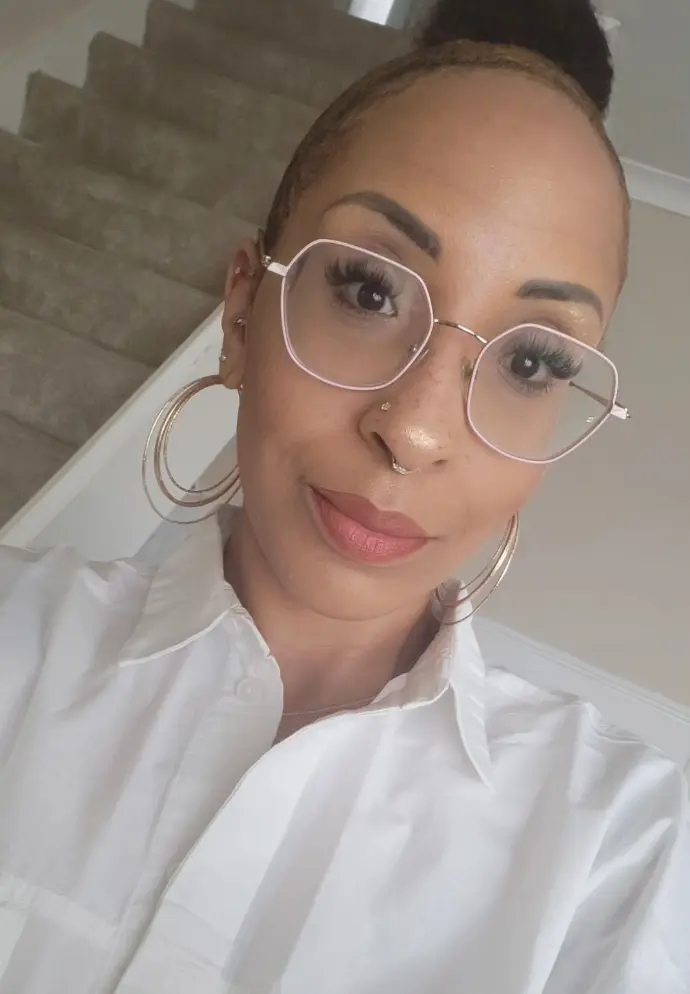Helen Eugene is a PhD researcher and EDI specialist and an active advocate for women’s health and hidden disabilities. She has multiple chronic physical health conditions herself but has used her experiences to help educate others around her, particularly in the workplace.
My name is Helen and I have multiple chronic health issues. At 35 I am in surgical menopause, I have an extensive history with endometriosis, I have fibromyalgia, early stages glaucoma in my left eye, and I often struggle with my mental health. But, I am actively working against it defining who I am and take away from the wonderful life I am destined to live.
Taking you back to January 2018, everything changed. I started to bleed through my clothes, I had swelling and bloating that was extremely painful, and I began a long battle with my GP to get referred to a gynaecologist. I fought hard for 9 months, which included crying at the doctors, emails, phone calls and trying to hold it all together. I was halfway through my masters when this all happened, and my son was 5 years old. After 9 months I was referred to a Gynaecologist. I had my first surgery in March 2019 and went on to have three more.
Due to so many surgeries within a short space of time, I was diagnosed with fibromyalgia in 2021, which is a long-term condition and recognised disability that causes pain all over the body.

Coping with work
Trying to work while being so poorly continues to be a challenge. While in the Civil Service I had to teach my line managers how to support myself and others. I realised it was the only way for me to survive. I needed to create a safe space for myself and others.
I felt nervous, scared and incredibly anxious. I experienced waves of self-doubt, but I never felt embarrassed. I began to feel proud of what I achieved, and the changes that would take place because of it. More than anything, I was motivated by the feedback I received from others, and I had a strong desire to create a safer environment.
Educating others
I wanted to share my story to reduce isolation and fear for others who were suffering in silence. I knew several women who used annual leave for surgeries due to fear of taking sick leave and telling their managers. This was unacceptable to me, and I needed to make a change.
I released blogs, ran endometriosis and menopause events, and I also trained as a mental health first aider. This was received well, and with the support of my Women Empowered Committee, I created five line-manager toolkits on different health issues (including heavy menstruation, breast cancer and PCOS), and created a health strand.
Garnering support for other women, and having them share their stories during live events was amazing. Having male managers wanting to learn more about supporting female staff was refreshing and I also received an award for my contributions to diversity and inclusion.
Managing my mental health
In 2021, I was suicidal due to the pain, uncertainty, and changes taking place in my body. I sought therapy via work, and also confided in those around me. It was the darkest time of my life, and I still have challenging days. The days where I can barely walk and require aid from my husband are the hardest, but I take things one day at a time. We can only do what we can. That is something I had to learn.
Some days I don’t recognise myself, and other days I live my life to the fullest. It can be very lonely and isolating when managing invisible illnesses and disabilities.
How to help
Ignorant comments from others cut deep, and I used to fight back equally as hard. Now I educate them, and work on improving the narrative for those of us suffering in silence. Here are some tips to help you do the same:
- If you want to write a blog, but feel too nervous about it, write one anonymously. Those people will still benefit from you speaking up, even if you don’t know it.
- There will be some people who will doubt you and fail to support you. Let it go. Holding onto it will make your health worse.
- Find comfort in those with similar stories or who have natural empathy.
- Use notes in meetings about your health and do not feel bad about taking sick leave or time for yourself.
Please don’t ever feel like you are completely alone. Trust in yourself and advocate for yourself when dealing with medical professionals, work, and those around you. Keep a diary of your symptoms, and how you are feeling. Find comfort in support groups and those with similar stories.
The Smile app is revolutionary. It can connect us all together and provide varied support. If I had this in the early days of my challenges, I don’t think my dark times would have been so dark.
Smile is a mental health app for people managing chronic physical health conditions. Download now from Google Play or Apple App store